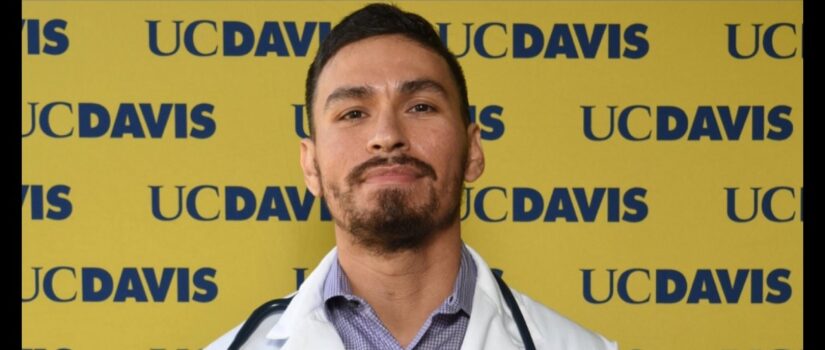Jonathan sometimes can’t believe he’s even alive, let alone starting his third year of medical school at UC Davis. He came from Mexico with his parents as a toddler and grew up in a rough neighborhood of Redwood City. His dad was incarcerated during Jonathan’s childhood, and Jonathan himself dropped out of high school and spent time in juvenile hall. Many of his childhood friends didn’t make it.
When he saw his younger brother starting to follow in his footsteps, Jonathan became determined to turn his life around. He enrolled in community college to set a different example for his brother, working in restaurants and as a laborer to make ends meet. As a first-generation college student, Jonathan didn’t start off with a clear vision of where it would all lead, and he took community college classes for seven years. Eventually a mentor urged him to transfer to UC San Diego to pursue his bachelor’s degree, and the puzzle pieces began to fall into place.
Jonathan first considered a major in business and economics, thinking that bringing wealth into his community might be the best way to give back. Then he got hooked on the idea that improving people’s health would have even greater value, so he switched his major to biology. It was still a long path to prepare for med school, and Jonathan worked for four years after graduating from college. His jobs included serving as a mentor and tutor in juvenile hall and a case manager in community mental health clinics. Eventually, Jonathan applied and was accepted to the UC Davis School of Medicine.
Then there was another barrier to overcome: figuring out how to pay for it. Jonathan is undocumented, which means that even though he has DACA status (Deferred Action for Childhood Arrivals), he’s not eligible for federal financial aid. While the California Dream Act provides state aid to many undocumented undergraduate students, there’s no comparable resource for graduate or professional school.
“Being able to get interest-free student loans from Hebrew Free Loan has given me peace of mind. Getting through medical school is hard enough, without having to worry about where the money will come from to pay for it.”
Medical school is expensive for everyone, but for undocumented students, the cost can be insurmountable. Jonathan and others in his position have to piece things together through a combination of school-based loans and grants, private student loans from banks or credit unions, and help from family or friends. For Jonathan, interest-free student loans from Hebrew Free Loan’s Pollak Community Loan Program are helping to close the gap.
Jonathan is excited to be starting his clinical rotations, and he looks forward to getting hands-on experience in different areas of medicine. He doesn’t yet know what he’ll specialize in, but right now he’s drawn to psychiatry, trauma surgery, and emergency medicine. He hopes to do his psychiatry rotation in a state prison. Jonathan has seen firsthand the complex health challenges facing underserved populations like the incarcerated or unhoused, and he knows these problems don’t have quick fixes or easy solutions. But he’s committed to showing up, continuing to learn, doing what he can to improve people’s health, and keeping the faith that it all makes a difference.

